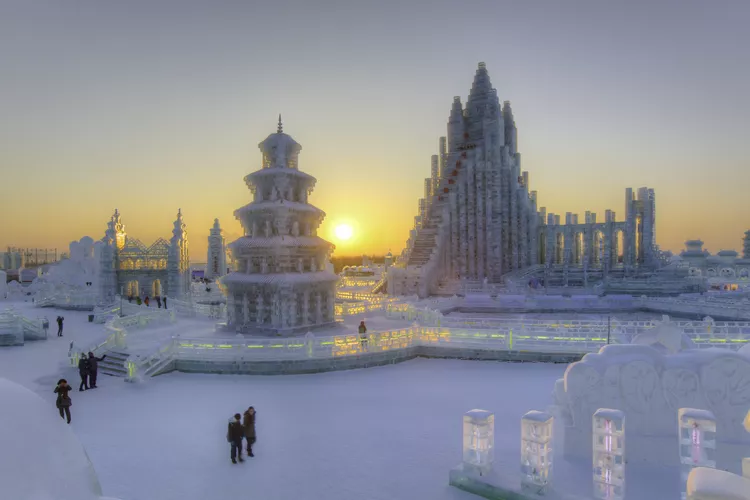Winter Events & Holidays
Christmas in China
Date: December 25
While Christmas is not considered a traditional holiday in China, the festive spirit is evident as department stores, shops, and hotels adorn themselves with decorations. If you’re in need of holiday treats like Christmas cookies and turkey, larger cities such as Beijing or Shanghai will have them available.
Harbin Ice & Snow Festival
Date: annually early January to mid-February
This festival showcases breathtaking winter landscapes in one of the coldest regions of China. Enormous ice and snow sculptures fill the parks, and the lantern festival adds beautifully colored lights that illuminate the ice castles. As you enjoy this spectacle, rest assured that heated hotels and restaurants will offer a warm respite from the frigid weather. The city’s Russian influence is reflected in the local cuisine, featuring traditional dishes such as dark Russian bread, hot borscht, and ice-cold vodka, alongside regional favorites.
Chinese New Year
Date: Variable, based on lunar calendar
Chinese New Year is the paramount holiday in China. While visitors marvel at the dazzling decorations like vibrant lanterns and kumquat trees at building entrances, locals typically return home to celebrate with their families. Cities like Guangzhou, Shenzhen, and Shanghai see millions of migrant workers traveling by train and filling transportation systems to head home. Although many hotels and restaurants remain open during the festivities, expect them to be less staffed.
Lantern Festival
Date: Celebrated on the 15th day after the New Year.
This vibrant festival, which has been observed for over 2000 years, marks the conclusion of the Chinese New Year celebrations. The night is illuminated by hundreds of colorful lanterns, each one crafted uniquely to depict various themes, including animals and objects.
General Activities
While attending special events is exciting, there are numerous activities and sights to explore throughout China during winter.
Winter Sports
Skiing and snowboarding have surged in popularity, with new resorts regularly opening. The Beijing Nanshan International Ski Slope & Resort features the country’s first snow football field, and Yabuli Ski Resort stands out as the largest ski destination in China.
Food Culture
As temperatures drop, indulging in China’s diverse culinary offerings becomes a must. Cities showcase unique regional delicacies, from steaming Shanghai dumplings and Sichuan spiced hot pot to Hunanese fire-rubbed pork ribs and crispy Beijing duck.
Hiking the Great Wall
Despite winter’s chill, all four sections of the Great Wall (Badaling, Mutianyu, Juyongguan, and Jinshanling) remain accessible. Options for self-guided and guided tours make it easy for visitors to choose a level of difficulty suited to their experience.
Spa Experiences
Rejuvenation opportunities abound in China’s spas, ranging from foot massages to full-body treatments. After a day of exploration, enjoy the soothing services at bathhouses and hot springs, with options tailored for Western travelers; consult your hotel for trusted recommendations.
Warmer Weather
If cold weather isn’t your preference, consider visiting southern China, where temperatures tend to be milder. In certain southern regions, you’ll find it more pleasant than the heat of summer. However, keep in mind that winter in southern China can be wet, so it’s wise to pack rain gear.
- Xiamen is a scenic coastal city with beautiful beaches and rich historical significance as a former foreign outpost.
- Guangzhou, another southern destination, once served as a foreign enclave and now plays a key role in China’s manufacturing industry.
- Hong Kong in winter offers a delightful experience with comfortable weather, perfect for exploring.
- Macau, known for its captivating cultural center steeped in Portuguese heritage, is an easy add-on for your travel itinerary.
- Hainan, the country’s largest island in the South China Sea, boasts mild temperatures and scenic beaches, ideal for relaxed strolls even if swimming isn’t feasible.




